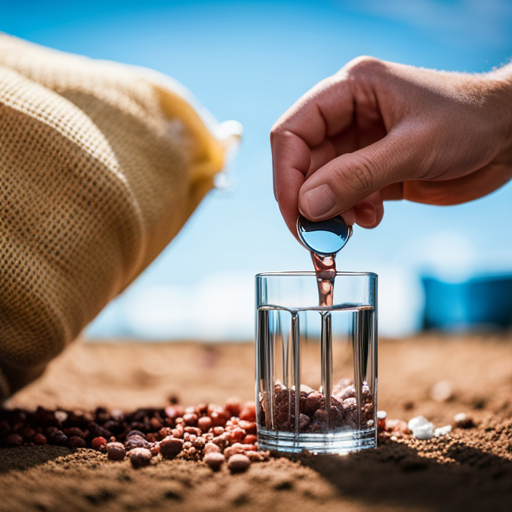Water softener systems are essential for preventing mineral buildup and ensuring that your plumbing and appliances function properly. However, maintaining your system requires the use of water softener salt. With so many different types of salt available, it can be challenging to determine which one is the best fit for your system and needs.
In this article, we will explore the differences between water softener salt pellets and crystals and their advantages and disadvantages, as well as provide tips on how to choose the right salt for your particular system.
When it comes to choosing between pellets and crystals, there are several factors to consider. Each type of salt has unique properties that can affect the performance of your water softener system. Additionally, there are environmental considerations to keep in mind.
By understanding the differences between pellets and crystals and the factors that impact their effectiveness, you can make an informed decision about which type of salt is best for your home.
Key Takeaways
– The type of water softener salt to use (pellets or crystals) depends on the specific system and water usage.
– Following manufacturer recommendations and user manuals is crucial for optimal performance and avoiding costly repairs.
– Potassium chloride is a good alternative to sodium-based water softener salt and can minimize the environmental impact of using water softener salt.
– Cost analysis and salt compatibility should be considered when choosing between pellets and crystals.
Types of Salt
The pre-existing knowledge highlights that the two main types of water softener salt are pellets and crystals, with each having unique properties that make them suitable for certain systems and water usage.
Pellets are recommended for all-in-one systems and medium-to-high usage homes due to their high purity levels and ability to dissolve quickly in water.
On the other hand, crystals are better suited for two-part systems and low usage homes as they have a slower dissolution rate and are less likely to form bridges in the brine tank.
When considering the cost comparison and analysis between pellets and crystals, it is important to note that different brands and types of salt may contain varying amounts of impurities. Therefore, it is crucial to follow manufacturer recommendations and use the appropriate type of salt to ensure optimal performance and avoid costly repairs.
Additionally, overfilling or using low quality salt should be avoided, as they can damage the water softener system and reduce its effectiveness.
Ultimately, the decision between pellets and crystals should be based on the specific system and water usage, and should be guided by manufacturer recommendations and user manuals.
Considerations for Performance
Performance considerations play a crucial role in determining the most suitable type of salt for a water softener system. One important factor to consider is salt purity. Different brands and types of salt may contain varying amounts of impurities, such as calcium and magnesium, which can reduce the effectiveness of the water softener system. It is recommended to use high-purity salt to ensure optimal performance and prevent buildup in the system. Some manufacturers even require the use of a specific type of salt to maintain the warranty on the system.
Cost comparison is another consideration for performance. While pellets and crystals both effectively soften water, they may vary in price. Pellets are often more expensive than crystals, but they are recommended for all-in-one systems and medium-to-high usage homes. On the other hand, crystals may be a more cost-effective option for two-part systems and low usage homes.
Overfilling or using low-quality salt should be avoided, as it can lead to system damage and costly repairs. Ultimately, the decision between pellets and crystals should be based on the specific system and water usage, as well as manufacturer recommendations and cost analysis.
Environmental Impact
One significant aspect to consider when using water softeners is the potential environmental impact caused by the discharge of high levels of sodium into wastewater. While water softener salt is essential for the proper functioning of the system, the high levels of sodium discharged into wastewater can have adverse effects on the environment. The sodium discharged into wastewater can harm aquatic life, increase the salinity of freshwater sources, and damage vegetation in the surrounding areas.
To minimize the environmental impact of water softeners, salt alternatives such as potassium chloride can be used. Potassium chloride is a viable alternative as it does not contain sodium and is safe for the environment. Additionally, magnetic water softeners can be used to reduce the need for salt altogether. These water softeners use magnets to alter the physical properties of the water to prevent buildup and scaling without the need for salt. By using salt alternatives or magnetic water softeners, the environmental impact of water softeners can be reduced, making them a more sustainable option for households.
| Pros | Cons | |
|---|---|---|
| Potassium Chloride | Safe for the environment | Expensive |
| Magnetic Water Softeners | No salt required | May not be as effective as salt-based systems |
Conclusion
In conclusion, choosing the right water softener salt is crucial for maintaining the effectiveness of your system and preventing buildup. When deciding between pellets and crystals, it’s important to consider the specific needs of your system and your personal preferences.
Pellets are a popular choice for their convenience and effectiveness in removing hard water minerals. However, they may be more expensive and have a greater impact on the environment.
Crystals, on the other hand, may require more maintenance but are typically more affordable and eco-friendly.
Ultimately, the choice between pellets and crystals comes down to personal preference and the specific needs of your system. By considering factors such as cost, effectiveness, and environmental impact, you can make an informed decision and keep your water softener system running smoothly.




